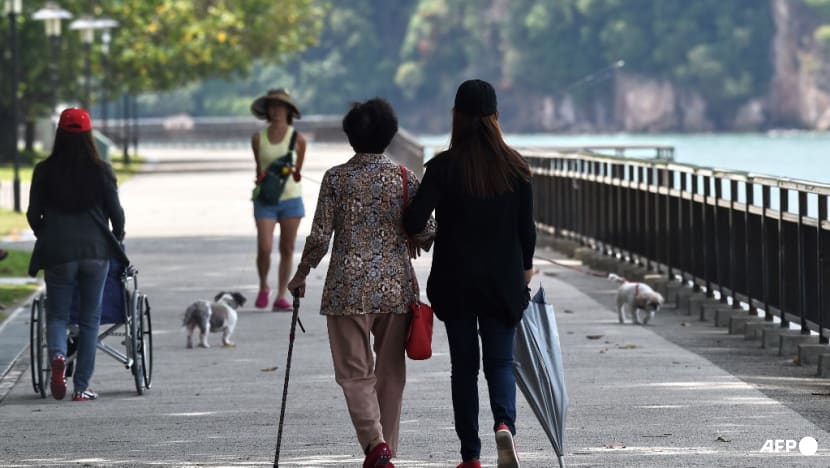Commentary: Frailty is often overlooked in discussions about growing old
As Singapore's elderly population grows, frailty is emerging as a pressing health challenge, say Tan Tock Seng Hospital’s Dr Tan Huei Nuo and Jasmine Kang, and National Healthcare Group’s Dr Chen Wei Ting.

File photo. A caretaker walks with an elder woman in a park in Singapore. (Photo: AFP/Roslan Rahman)

This audio is generated by an AI tool.
SINGAPORE: We first saw Mdm M in the ward on a Friday morning, an 86-year-old lady recovering from a severe bout of pneumonia. Her condition had improved after two weeks in hospital and her oxygen support had been removed, but she was unable to get out of bed unassisted, nor walk across the room without someone holding her. This was a vast difference from before she fell ill, when she was able to perform these daily tasks independently.
Most people would think this is typical for a hospitalised older adult and simply part of ageing where we cannot do anything about slowing down and becoming more decrepit.
We are prepared to plan for our retirement and old age in terms of savings and living arrangements, but we assume poor health is inevitable with ageing.
This often becomes a self-fulfilling prophecy, as seen in a 2022 study in the Journal of the American Medical Association Network. It found that one’s mindset about ageing correlates with one’s risk of dying, physical health, health behaviour, and psychological well-being.
AN OVERLOOKED ASPECT OF AGEING
In medicine, we use “frail” to describe patients who struggle to cope with medical issues, for example pneumonia, anaemia or viral infections, and have poorer outcomes when compared to non-frail patients of similar age.
Their increased vulnerability is due to the reduced reserve of the ageing biological system, akin to that of an old car that breaks down more easily due to the reduced performance of its mechanics. Hence, as one gets older, one’s likelihood of becoming frail also increases.
While frailty may have been a little-known concept as recently as 10 years ago, it is certainly in the spotlight now. Just ask those who watched the US election debate between Donald Trump and Joe Biden earlier this year. Biden’s performance sparked questions and conversations about fitness and frailty.
In Singapore, where there are just over 750,000 residents aged 65 and over, it is estimated that at least 30 per cent of our elderly are considered pre-frail and up to 5 per cent are frail.
As society ages, Singapore is expected to have 900,000 seniors aged 65 and above by 2030 - one in four Singaporeans. This underlines the importance of addressing the potential challenges associated with frailty.
The National Frailty Strategy Report, published by the Ministry of Health last year, outlines a strategy to prevent, detect and manage it. Many countries, including Canada, the United Kingdom, Japan and China, are also addressing growing health issues associated with frailty.
RAISING THE ALARM AGAINST INCREASING FRAILTY
Understanding what drives frailty is key to finding effective measures to prevent or slow it down, especially when it is present in the early stage.
In fact, research studies have shown that frailty is preventable and its progression, in a spectrum, can be altered.
The National Frailty Strategy Report emphasises an active lifestyle as an important preventive management. This is in line with United Nations Decade of Healthy Ageing, a global collaboration led by World Health Organization (WHO), which focuses on healthy ageing to improve the quality of lives of older people.
Longitudinal studies have identified many potentially modifiable factors associated with frailty, including reduced physical activity, smoking, poor nutrition, and loneliness. To illustrate, in a large study of English older adults in 2019, the presence of those factors increased the risk of becoming frail by two times or more.
Effective prevention strategies include improving nutrition, increasing physical activity, increasing social connectedness, ensuring optimal management of chronic diseases, and sensible use of medication. These efforts are best done early, before the onset of frailty, because as frailty sets in and worsens, it will reach a point where it may no longer be remediable.
MANAGING FRAIL PATIENTS IN THE HOSPITAL
Frail older adults, in addition to having an increased risk of premature mortality, disability and poor quality of life, are also at a higher risk of complications when they are hospitalised. These complications may take the form of declined physical function, delirium, and other medical issues including infections, strokes and heart attacks.
Hospital care traditionally focuses on treating the immediate condition that the patient presents with, but with an increasingly elderly and complex patient population, it is imperative that hospitals take a proactive approach to recognising frailty and providing appropriate interventions alongside acute treatment.
Mdm M suffered from delirium during her hospital stay, pulling out tubes and her oxygen mask in a state of confusion. She was disorientated with where she was and what was going on and wanted to go home. Fortunately, this state was transient for her. The medical team treated the underlying causes of her delirium, the nurses caring for her delivered the delirium care bundle, and the allied health team initiated mobilisation and rehabilitation early. She eventually settled down as her condition improved.
Mdm M would have been considered healthy for her age as she does not suffer from any chronic diseases and had no previous hospitalisations. However, on closer look, her medical team saw clues pointing to her frail status.
In the past few years, she had reduced her social interactions, especially after her son moved overseas for work. Her meals often comprised simple canned food and bread as she did not feel like shopping for groceries. The more her physical activity level decreased, the more her energy level dropped because the body was negatively conditioned, resulting in a downward spiral.
ALL HANDS ON DECK TO TACKLE FRAILTY
This scenario is becoming increasingly common in Singapore as more elderly residents live alone, either from a strong preference for independence and reluctance to burden their families or due to a lack of a close network of support from family or friends.
Not everyone who is frail regains their function like Mdm M and many end up needing some care support or having to make new living arrangements. A handful stay longer than needed in the hospital as they await long-term care placements, which are also limited across the island.
In the long run, other than having better acute care for frail patients in the hospital, the momentum needs to be continued when they are back in the community. Ultimately, the goal is to have in place an integrated and coordinated support system so that frail seniors age in place as much as possible, in an environment they are familiar with.
After her discharge, Mdm M underwent rehabilitation sessions in the Day Rehabilitation Centre. She also now frequents the Active Ageing Centre near her home and participates in a variety of activities that she enjoys.
Frailty is a complex, multidimensional syndrome. Delivering quality healthcare to frail older adults requires a vastly different approach from the single-disease model.
In addition to addressing frailty when patients arrive at the hospital’s doorstep, having community-based prevention programmes will promote early detection and facilitate implementation of interventions such as nutrition, physical activity, and social support - key elements in preventing or slowing down the progression of frailty.
Developing a health and social care system conducive to the care of frail older adults is an important step towards improving their well-being and helping them achieve the holy grail of healthy ageing.
Dr Tan Huei Nuo is Head of the Department of Geriatric Medicine in Tan Tock Seng Hospital and chairs the hospital’s Frailty-Ready Hospital framework.
Jasmine Kang is Deputy Director of Nursing in Tan Tock Seng Hospital and a Geriatric Advanced Practice Nurse. She leads the framework for inpatient care of the frail elderly workgroup in the hospital’s Frailty-Ready Hospital steering committee.
Dr Chen Wei Ting is Deputy Director for Community Health at the National Healthcare Group. She leads NHG Community Health Teams in providing frailty management programmes in the community.


























